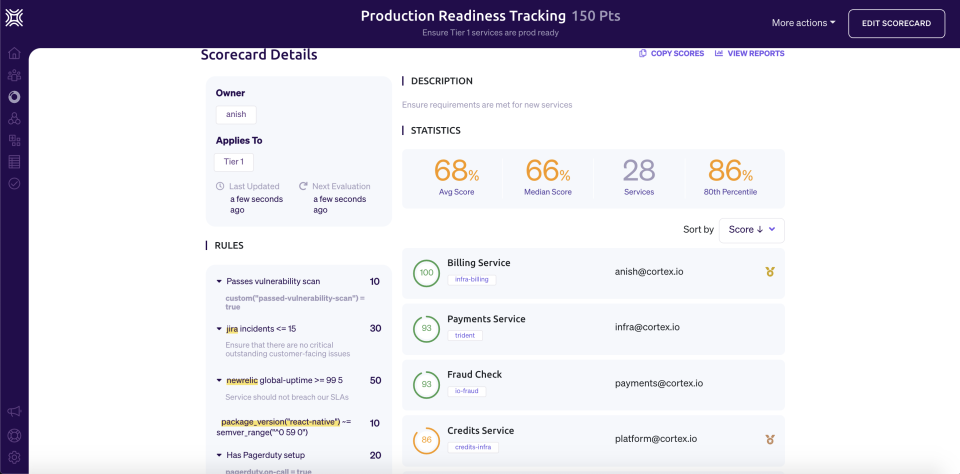Cortex raises $15M Series A to help development teams wrangle their microservices
Cortex, a startup that helps engineering teams get improved visibility into the Rube Goldberg machine that is their microservices architecture and improve their overall development practices around it, today announced that it has raised a $15 million Series A funding round led by Tiger Global and Sequoia Capital, which led the company's $2.5 million seed round. A number of angel investors, including Gokul Rajaram, Snyk CEO Peter McKay and Front co-founder and CEO Mathilde Collin, also participated in this round.
Current customers include the likes of Grammarly, 8x8 and Rappi. Cortex says it experienced 10x customer growth since its launch in May 2021 (though we're probably talking about a relatively low baseline here).
The company's mission is to build a system of record for engineering teams -- or at least those that adopt modern development practices. It's this services catalog that's at the heart of what Cortex does and it was also the first product the team launched. Now it is starting to build out its features around this catalog.
"We very quickly realized that once you have all these microservices being tracked in this catalog, you can do some interesting things there," Cortex co-founder and CTO Ganesh Datta said.
Image Credits: Cortex
"Engineering leaders have very limited visibility into which teams are performing well or need additional resources across critical initiatives and reliability, security and just overall adoption of best practices," said Cortex co-founder and CEO Anish Dhar. "On the other hand, you see teams like SRE, security and platform, who are still stuck using Excel spreadsheets, tracking hundreds, sometimes thousands of services across several teams. How do you actually align these teams and drive consistency?"
The goal here is to give engineering leaders insights into the quality of their services, but also to help the engineers themselves understand what services are available and what their status is.
That means a team can use Cortex to define its production readiness, for example, by setting up a checklist of criteria a service needs to meet before it's ready to be pushed live (this could include a dashboard, alerting, on-call rotations, etc.). All of this is done using the company's Cortex Query Language (CQL).
Cortex pulls in data from about 30 commonly used tools like GitHub, Bitbucket, Datadog, GitLab, Jira, SignalFX and your Kubernetes clusters.
"What's really impressive about Cortex is it works from both top-down as well as bottom-up," Sequoia partner and Cortex board member Bogomil Balkansky explained. "It has a very strong value proposition for both engineering leaders and engineering executives in the sense of giving them a great framework for how to set expectations and standards across organizations -- and how to say, 'hey, every service in our organization needs to do X, Y and Z, needs to be upgraded to the latest version Node.js, needs to have these and these things -- and then being able to track what percentage complies with all we call expectations. But it also helps individual engineers and individual teams keep track of their own work."
With today's announcement, the company is also launching its Service Creation tool, which gives developers a basic scaffold for new services based on their own templates. In a way, that's a logical next step for the company. There's no better way to help teams improve the consistency of their microservices practices than by automating them, after all.
Also new with today's release are new teams features to help improve cross-team collaboration and developer onboarding.
"As Salesforce did for sales, Marketo did for marketing and ServiceNow did for IT, Cortex now does for engineering," said John Curtius, partner at Tiger Global. "Cortex helps teams set best practices and guidelines for development, making it easy for engineering, SRE, security and DevOps to work together to create higher quality services. Cortex orchestrates a culture change where engineering organizations become proactive in their approach to software quality and are resilient to the inevitable and constant changes that come with building software."

 Yahoo Finance
Yahoo Finance 
